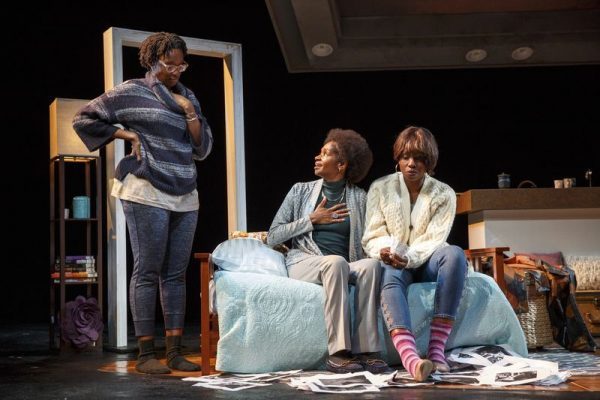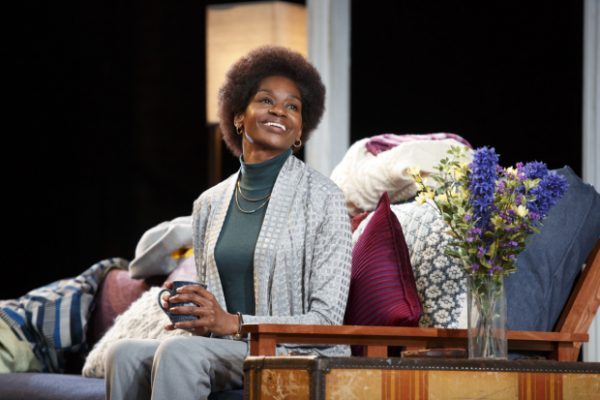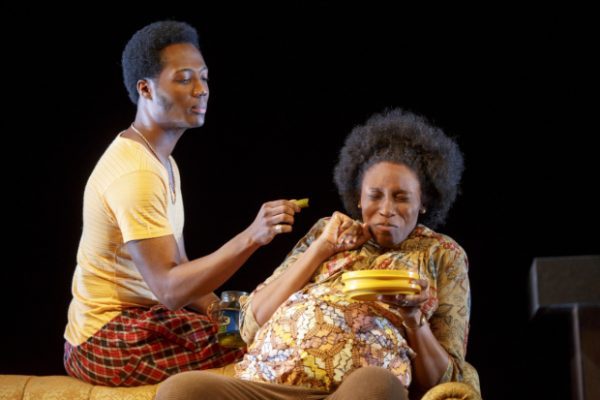
Abasiama Ufot (Jenny Jules) puts her hand to her heart as she brings together her two daughters, Adiagha Ufot (Chinasa Ogbuagu) and Iniabasi Ekpeyoung (Adepero Oduye), in Her Portmanteau (photo by Joan Marcus)
New York Theatre Workshop
79 East Fourth St. between Second & Third Aves.
Tuesday – Sunday through June 11, $69
www.nytw.org
New York Theatre Workshop’s presentation of two works from Mfoniso Udofia’s ambitious nine-part Ufot Family Inner Cycle, continuing through June 11, consists of a pair of works of surprisingly different quality, one strong and intimate, the other earnest and distant. At the beginning of the beautiful Her Portmanteau, a circular portion of the center of the stage revolves like a luggage carousel at an airport, with various items and suitcases passing by several times. Each one represents an unseen person, traveling to a destination or returning from a trip; a collection of four sharp red valises of different sizes represents a family. Thirty-six-year-old Iniabasi Ekpeyoung (Adepero Oduye) enters, looking for her suitcase, grabbing an old red one all by itself. Clearly upset, she uses a pay phone to make a call, speaking an African language. She is soon approached by thirty-year-old Adiagha Ufot (Chinasa Ogbuagu), who has come to pick her up because her mother, Abasiama Ufot (Jenny Jules), is late, having GPS problems. “My ZipCar’s parked right outside. We can . . . I’m here to take you back with me . . . to my apartment in Inwood. . . . I mean on the island . . . I don’t know how to explain. . . . My apartment in the city,” Adiagha says, unclear if Iniabasi understands what she’s saying. Instead, Iniabasi remains nearly silent and reluctantly accompanies Adiagha. She is still unsettled after going up the five flights to Adiagha’s apartment, where they are joined by Abasiama. Iniabasi eventually starts talking, but she’s not pleased with the situation. “I come here and find a woman who very suddenly, strangely has a completely different face from the pictures I have and who can’t even speak her real language. Yawping at me in English! What am I to think,” she says. Adiagha, meanwhile, declares, “We are so happy. I wish you could see my insides. Joy! . . . Joy!” It is soon revealed that Abasiama gave birth to both of the women, but by different men. While Iniabasi remained in Lagos with her father, Adiagha and Abasiama immigrated to Massachusetts.

Jenny Jules stars as Abasiama Ufot in Her Portmanteau (photo by Joan Marcus)
Over the course of 105 minutes, they tell stories about their life, both good and bad, sharing anecdotes from the old days, when they were together, including Adiagha’s visit to Nigeria as a child, filling in the details of what has happened to them during the past several decades. But it’s not all friendly; Iniabasi feels as deprived as ever, and she lets her mother and half sister know it as they try to reconnect and become a family again. Her Portmanteau features terrific performances by Jules, Ogbuagu, and Oduye, who wonderfully capture the realistic twists and turns as the characters feel one another out and search for their place in this new arrangement. Udofia (The Grove, runboybun) and director Ed Sylvanus Iskandar (These Seven Sicknesses, The Golden Dragon) are in no rush to reach any conclusions, letting things develop naturally on Jason Sherwood’s homey set, above which an angled rectangular ceiling ominously hovers, serving as a window to the outside world, a mirror of themselves, or an ever-present psychological weight.

Ukpong Ekpeyoung (Hubert Point-Du Jour) teases his pregnant wife, Abasiama Ufot (Ogbuagu), in Mfoniso Udofia’s Sojourners (photo by Joan Marcus)
Her Portmanteau is being performed in repertory with Sojourners, an Ufot family play that takes place thirty years earlier, in 1978, when Abasiama (Ogbuagu) is in Texas, eight months pregnant, in an arranged marriage to Ukpong Ekpeyoung (Hubert Point-Du Jour), her energetic, charming, but untrustworthy husband who disappears for days at a time. Ukpong is jobless and supposedly studying economics, but he spends most of his time listening to American R&B, dreaming of making a new life in the United States, while Abasiama is diligently studying biology and working the night shift in a tiny booth at a gas station, where she meets fast-talking troubled young prostitute Moxie Wilis (Lakisha Michelle May). The rotating stage also introduces us to Disciple Ufot (Chinaza Uche), a religious man who sits in front of a typewriter, exploring the causes and effects of Nigerian immigration. As Abasiama approaches her due date, the characters intertwine, accepting certain responsibilities while giving up on others. Also directed by Iskandar, Sojourners lacks the charm and immediacy of Her Portmanteau. It’s too long at more than two and a half hours, and the characters and their situations feels more standard and predictable. The narrative is also far too choppy, bouncing around from scene to scene without a smooth flow. Even the soundtrack is less interesting, with overly familiar American songs. However, despite the disappointing Sojourners, we’re very much looking forward to the next chapter in this family drama. You can see the two shows on different nights or back-to-back on weekends, in either order, as each fills in critical information about the other. In addition, NYTW has teamed with Eat Offbeat to provide between-show meals for twenty dollars, which need to be reserved in advance.